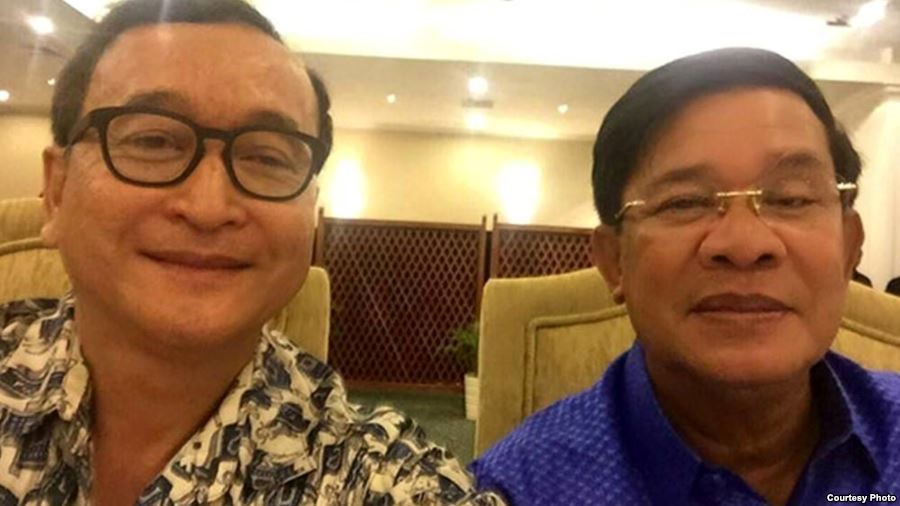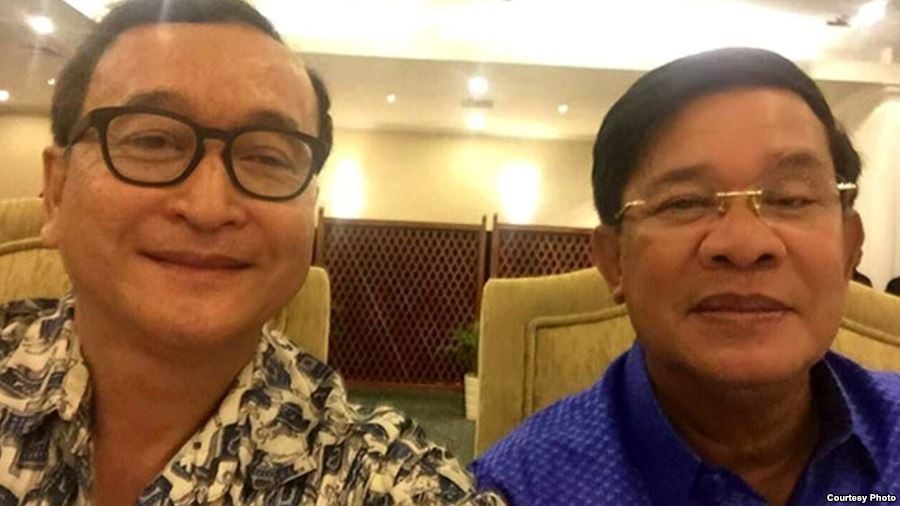
Prime Minister Hun Sen (right) and opposition leader Sam Rainsy pose for a selfie as part of the now seemingly exhausted “culture of dialogue” between the ruling Cambodian People’s Party (CPP) and the opposition Cambodia National Rescue Party (CNRP). Photo from VOA Cambodia.
Suffering from scandal and disarray, a leader missing in action, and losing ground on the all important social media front, the Cambodia National Rescue Party might need saving itself. Scott Rawlinson reflects on the chances of survival for Cambodia’s all-important opposition party.
As results were announced following the 2013 National Assembly elections in Cambodia, it was quickly apparent that something unprecedented was unfolding.
The long-time incumbent Cambodian People’s Party (CPP) took 68 seats in the 123 seat Assembly, six more seats than the 62 required for a majority.
Yet, what was shocking were the losses experienced by the CPP – the party took 90 seats in 2008 – and the gains of the Cambodia National Rescue Party (CNRP), which notched up a total of 55 seats and 44 per cent of the vote.
That the opposition was likely to make gains was a fact well-known to the ruling party. However, the extent of dissatisfaction and the opposition’s ability to rally youth and first-time voters caught them off-guard. The result compelled the party to take a long hard look at itself, to re-calibrate and re-organise in preparation for 2017’s commune elections and 2018’s national elections.
As such, 2015 was a busy year for Cambodian politics. In the long build up to elections in 2017 and 2018, Prime Minister Hun Sen has been on something of a “charm offensive”. This has mainly been through the strategic use of social media, most notably Facebook. It is now easier than ever to follow the prime minister as he meets foreign diplomats and leaders, delivers speeches on numerous public works projects, and interacts with ordinary – notably young – Cambodians.
The public relations offensive has fed into the implementation of policy. For instance, the government scrapped the toll on National Road 4, ending a 15-year controversial contract with private enterprise, and is committed to gradually increasing the pay of civil servants. Clearly, the government’s implementation of popular policies is designed to claw back and generate support from demographics the party was perceived to have neglected.
Hun Sen also personally intervened in the teething problems associated with a traffic law to reduce road deaths and injuries. He was encouraged to act after receiving a number of messages on his Facebook page to the effect that there were problems with the new traffic law. The move demonstrated not only his pre-eminence as an executor but also his flexibility.
There may also be faint signs of a lean towards more efficient governance and management. The latter part of February saw the stepping-down of the now former governor of Mondulkiri after numerous complaints regarding the slow development of the province. He has since been replaced by his deputy, who Deputy Prime Minister Sar Kheng has encouraged to push forward with development plans.
Furthermore, at the recent closing ceremony of the annual meeting of the Ministry of the Interior, Hun Sen lambasted several underperforming ministries, with the Ministry of Public Works and Transport singled out in particular. And, as promised, Hun Sen has followed through on his plan to reshuffle the cabinet. Recalling the disappointment of the 2013 election result, a major motivation for the prime minister has to be a desire to see much speedier, reactive and proactive initiatives being carried out by his ministries and ministers.
CNRP scandal and disarray
Meanwhile, the CNRP is dealing with an alleged sex scandal involving the party’s acting leader, Kem Sokha. That said, and with the past as precedent – Kem Sokha was the subject of a previous “sex scandal” – in the long-term the issue is likely to be more of an irritant than an indicator of the opposition’s terminal decline.
In response, Kem Sokha has implored his party to maintain unity in the face of scandal and politicking by the party’s political opponents. There also remains the issue of Sam Rainsy’s absence, which seems to have sown some discord within the opposition, particularly among younger activists. The long-time leader in exile has also just been hit with another defamation charge for a Facebook post he made regarding the PM’s ‘likes’ on the same social media platform.
Regarding popular policy, Kem Sokha has claimed that many of the government’s policies have their origins in the opposition party’s seven-point program.
From the government’s point of view such an approach makes sense. By carrying out the CNRP’s main goals they see an opportunity to defang and undermine the very raison d’etre of the opposition, nullifying them in time for the next polling day. For the CNRP it is potentially devastating — hence the efforts of Kem Sokha to broadcast his party’s role in applying pressure on the government when shaping the direction of public policy.
Furthermore, as other analysts have observed, the CNRP needs to focus on its own internal organisational strength and build from the grassroots. That need still remains.
No time for complacency
However, the government cannot afford to be over-confident, nor neglect the fact that serious institutional reforms are still pending. The spectre of 2013 still looms, and while the CNRP looks down it is certainly not out.
A recent annual report released by the local election monitor Comfrel scrutinised the Royal Government’s major policy platforms. It concluded that 26 per cent of respondents were satisfied with government performance in numerous policy areas. However, 62 per cent were only partly satisfied, and another 12 per cent were not satisfied. Many of the government’s key policy platforms remain only partially fulfilled.
This is perhaps to be expected with the government just over halfway through its mandate. But, as the saying goes, actions speak louder than words. Now the full weight of the CPP-led government’s time and resources need to be focused on the full fulfilment of numerous objectives. The laundry list of ‘must dos’ includes: improving transport networks, particularly in Phnom Penh where rush hour congestion poses daily frustration; providing a reliable electricity and clean water supply to all corners of the country; building colleges to raise the country’s knowledge and human capacity; and devising a pension system that covers workers from all branches of work, among others.
At the moment, the CNRP is unlikely to implode or explode any time soon – nor would it be helpful if this scenario played itself out. However, there remains a serious need for the party to get its own house in order. A strong opposition is crucial in Cambodia, as in any country, in order to hold the government to account, provide a check and balance, and pressure the Council of Ministers to implement laws that generate development and an improved quality of life for all.
Scott Rawlinson received his MA in South East Asian Studies from the School of Oriental and African Studies (SOAS), University of London. He is currently a Fellow, and Coordinator for Fellows, at the Cambodian Institute for Strategic Studies (CISS), Phnom Penh, and will commence his PhD at SOAS in September 2016. All opinions are those of the author and do not necessarily reflect the views of the Institute.
 Facebook
Facebook  Twitter
Twitter  Soundcloud
Soundcloud  Youtube
Youtube  Rss
Rss 